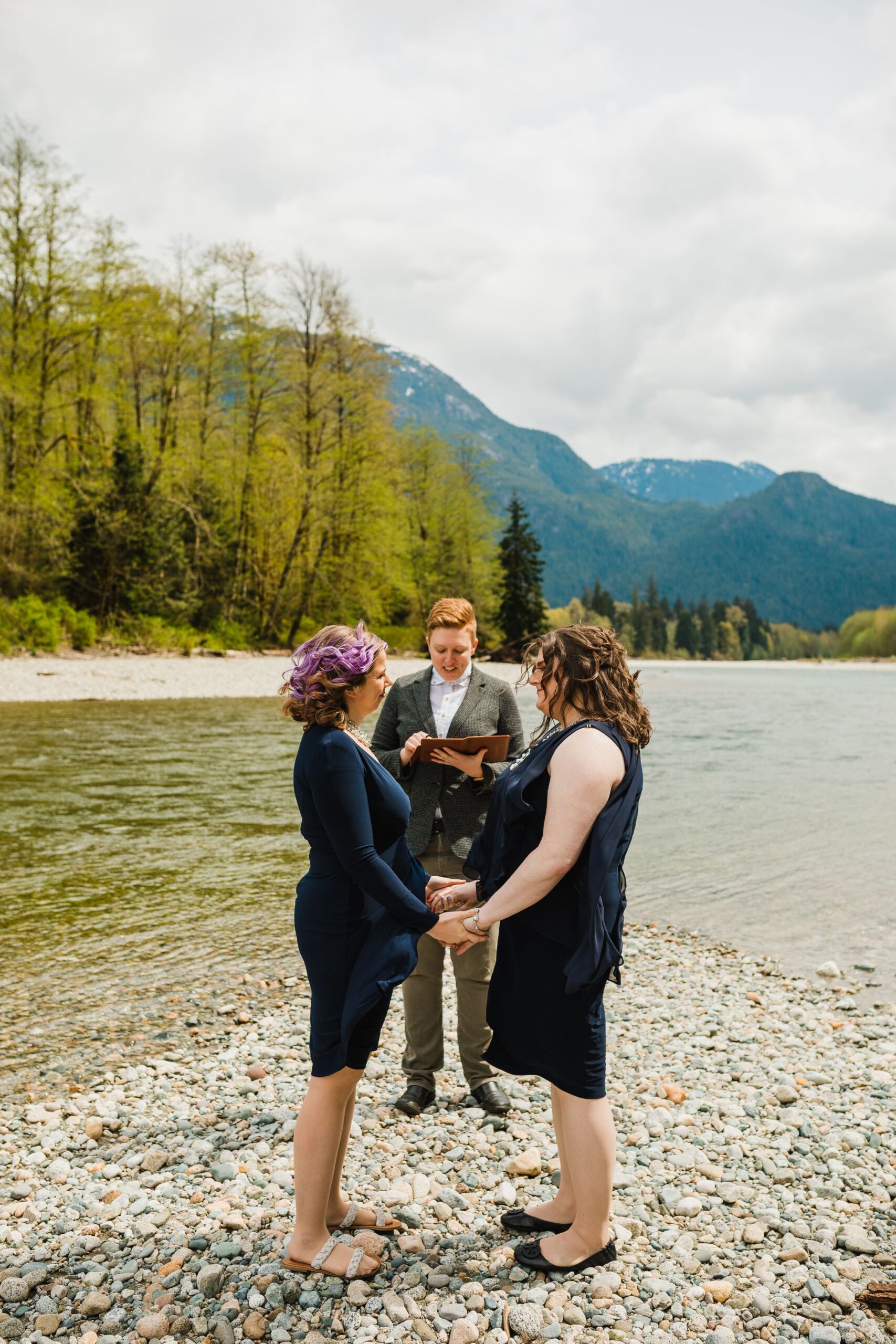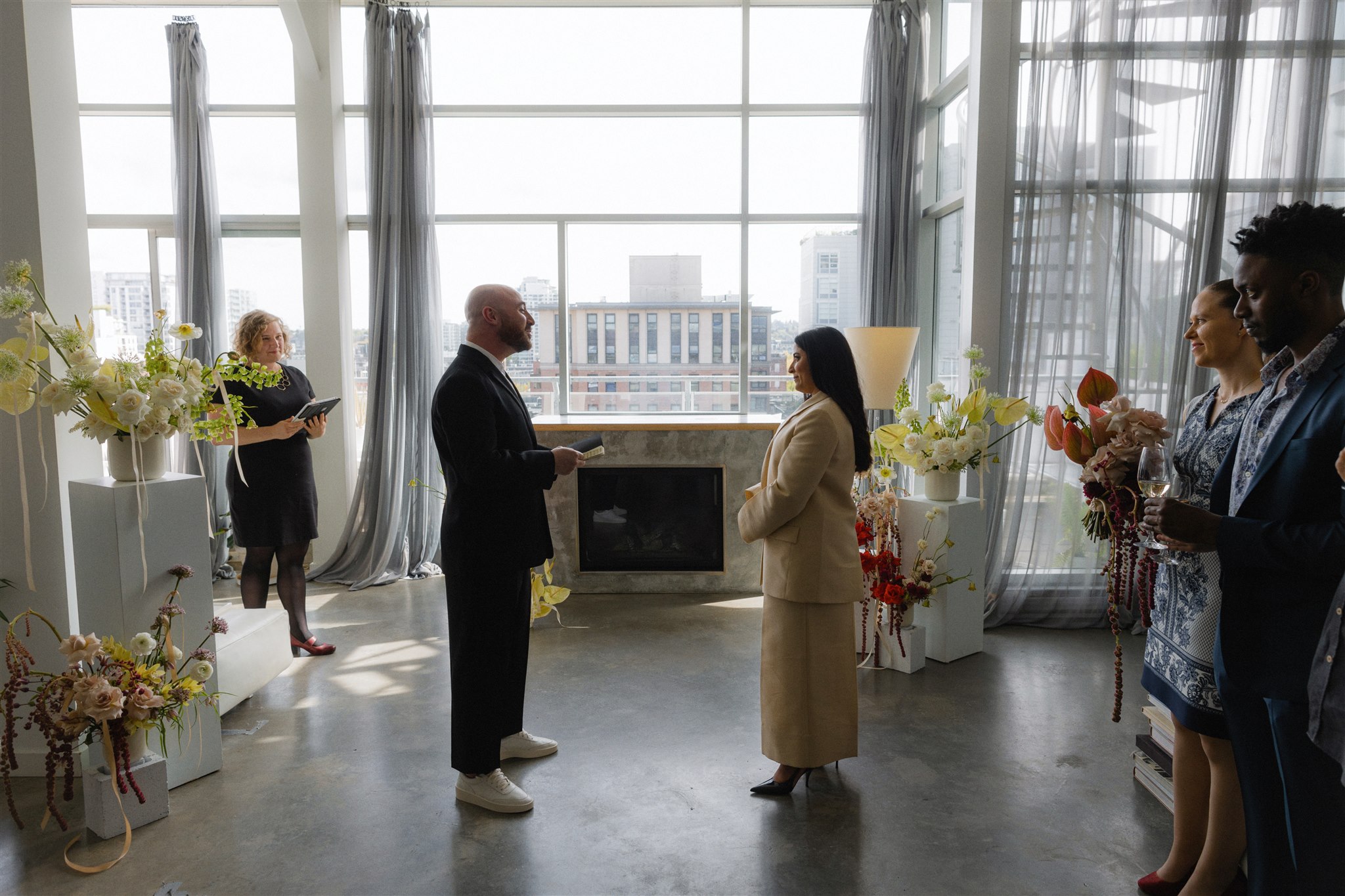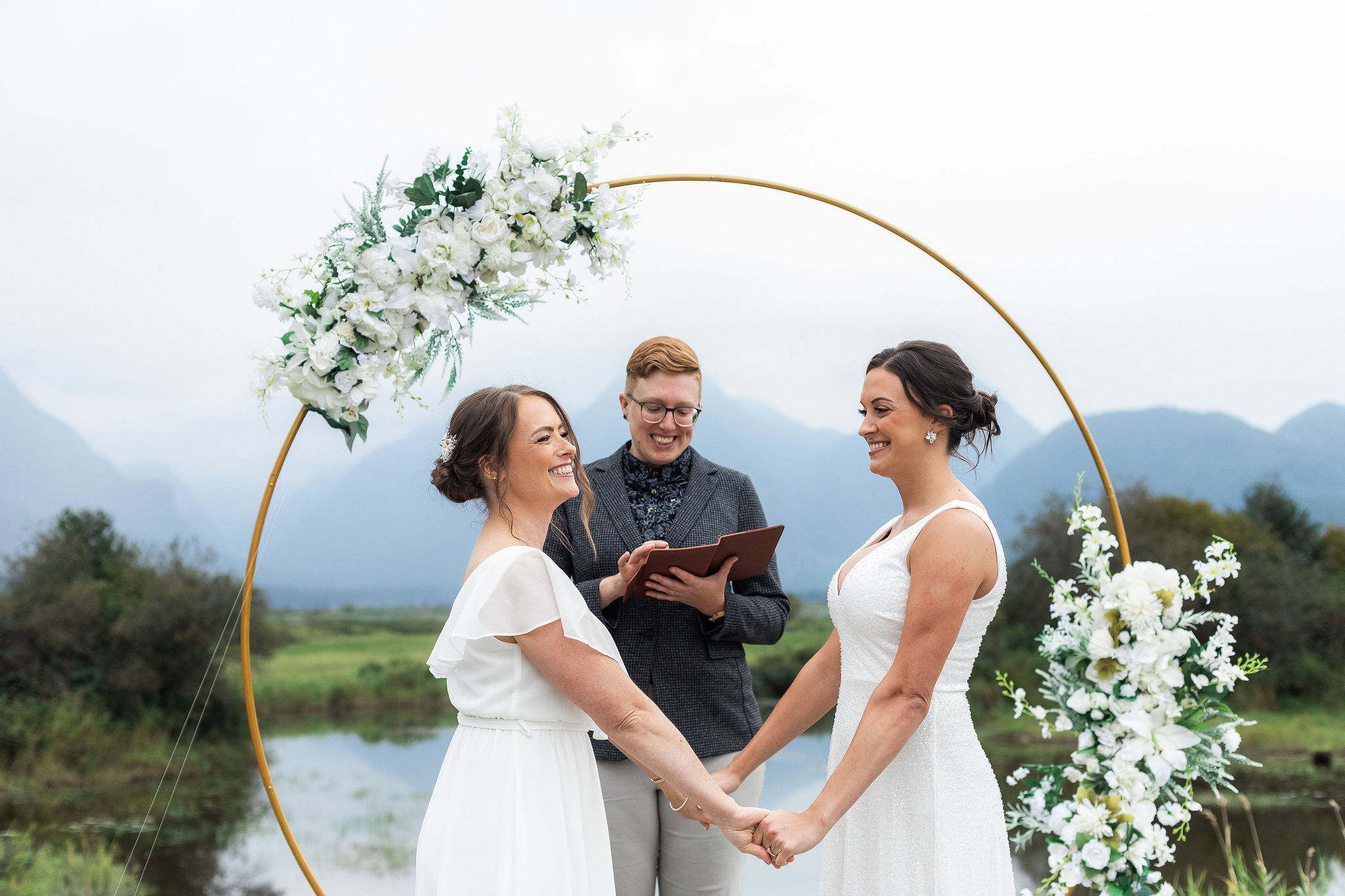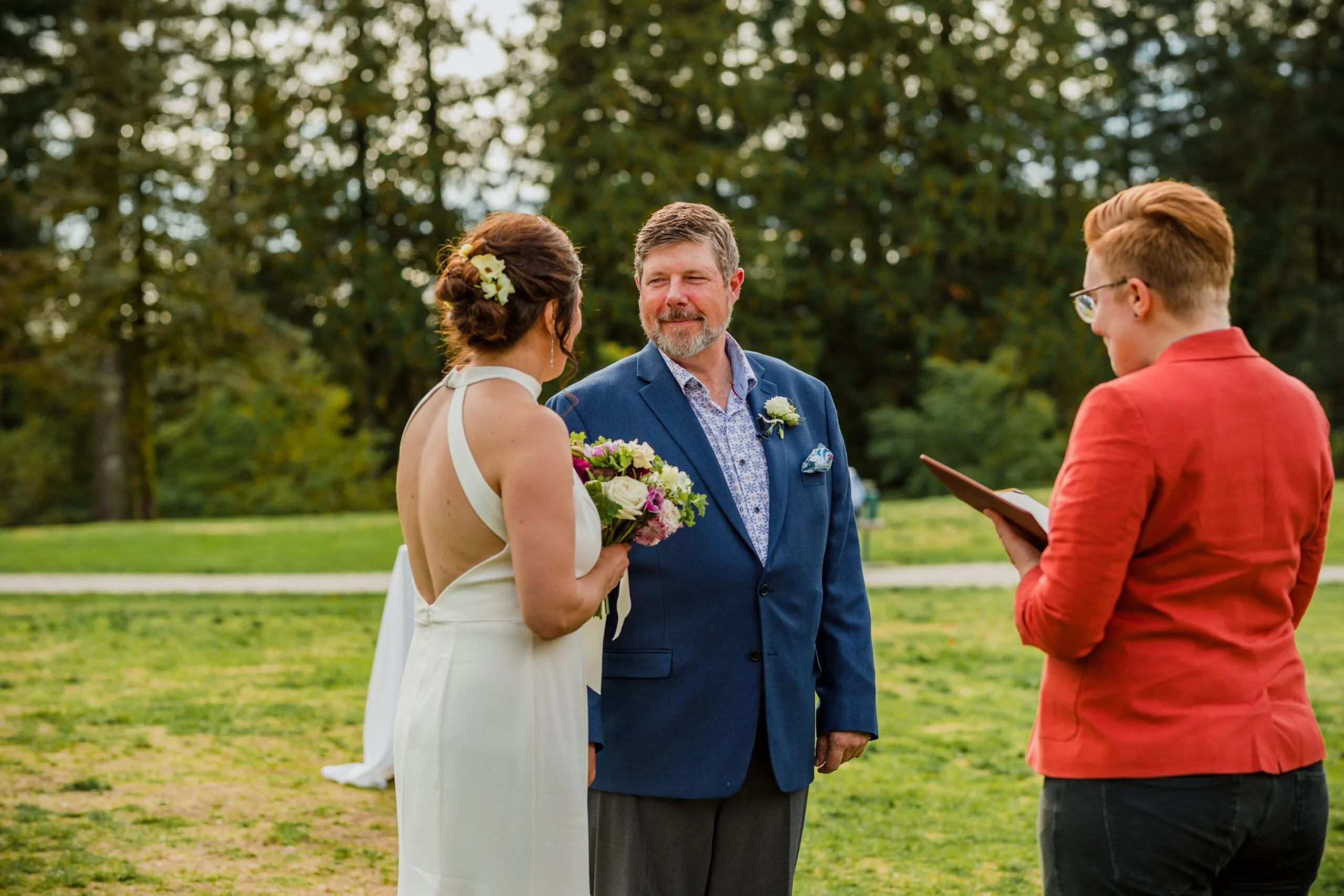As wedding officiants, we love celebrating love in all its forms – all genders, all faiths, all cultures, all backgrounds, all races and all languages! Often, we find ourselves officiating interfaith weddings or helping to blend multiple cultures during a ceremony, as people from different walks of life come together. And for our couples planning bilingual ceremonies, we have our bilingual wedding officiants take the lead!
We asked two Young Hip & Married bilingual wedding officiants to share their experience officiating weddings in a second language and their top tips for couples planning bilingual weddings!
Meet two of Young Hip & Married’s bilingual wedding officiants, Beth (French-speaking) & Shalom (Spanish-speaking)
Beth, who speaks French, and Shalom, who speaks Spanish, are both officiants serving Vancouver and the Lower Mainland. Below they share more about their experience with French weddings and Spanish weddings.
Beth says, “I think I’ve officiated 7 weddings now that have involved speaking some French. The majority of couples asked for the weddings to be fully or partially bilingual, with English and French woven together throughout the ceremony. One couple (whom I married just a few days ago!) eloped, and both of them grew up speaking French at home (one from Quebec, one from France), so they asked me to do their whole ceremony in French.”
Shalom shares, “I’ve done about 3 weddings in Spanish so far, including the VERY FIRST wedding I ever officiated! The weddings were completely in Spanish.”

How do I find a bilingual wedding officiant near me?
Start here! Young Hip & Married currently has French and Spanish speaking wedding officiants in the Lower Mainland. We are always growing our officiant team and hope to have more bilingual wedding officiants offering more languages in all of our locations soon.
Otherwise, you can always search for a bilingual wedding officiant on Google by simply searching the name of your city, the language you’re looking for, and the words “wedding officiant” (e.g. “Vancouver French wedding officiant”). You can also search wedding vendor databases, like The Knot or WeddingWire.
Another great way to find a multi-lingual officiant would be to ask friends or family. Particularly if you’ve seen a bilingual officiant in action at a friend or family member’s wedding, they should be able to provide you with an introduction!
You can also ask your other wedding vendors for recommendations. They may have the inside scoop on where to find a bilingual wedding officiant in your area.
Why do couples plan bilingual wedding ceremonies?
The main reason to plan a wedding ceremony in another language is to accommodate non-English speakers, whether they be guests or members of the couple getting married. Beth and Shalom share their experiences below:
“Usually, the couple is asking for bilingual services for the benefit of some of their guests who do not speak English, such as for family members flying in from Quebec or France for the weddings I’ve done in French,” Beth explains. “That way, those guests can understand what’s happening in their own language. Sometimes even if there aren’t guests attending from those places, one or both members of the couple still wants to have their mother tongue spoken as a way to honour an important part of their identity or their cultural origins.”
Shalom shares, “In each of the Spanish weddings I’ve officiated, at least one person in the couple had very limited English. In all cases, both parties getting married spoke Spanish as their first language, and the guests were Spanish-speaking as well.”

Should a bilingual wedding be fully translated?
With bilingual weddings, couples have two options: fully translated or partially translated. For example, let’s say a couple is planning an English/French ceremony. They could do the ceremony completely in both languages, fully translating every line, or choose to only translate certain sections. Beth shares more about how she advises her couples:
“One important thing I tell couples is that doing a full translation of each paragraph of the ceremony script will double the length of their wedding. Plus, most guests will be “tuned out” for half of that length, which is not ideal,” Beth explains. “After hearing that, I’ve found most couples opt to have only certain parts of their script translated verbally during the ceremony.”
Beth continues, “For example, for the part of the ceremony where I tell the couple’s story, some couples have chosen to provide a written translation for their guests who do not speak English, so they can follow along, rather than having me speak the whole thing in both French and English.”
As Beth points out, a great way to ensure your wedding ceremony isn’t double the length is to only verbally translate some sections, while having a full written translation in your wedding program. Your officiant will be able to guide you on what sections should be verbally translated, versus which may be better to translate in writing. Plus, they can provide you with your ceremony script ahead of time for easy translating!
Can I say my vows in Spanish for a wedding ceremony?
Of course! Your vows are your heartfelt words about the love you share and the marriage you’re building together. You should absolutely feel free to say your vows in Spanish or whatever language feels right for you and your partner. You have the option to say your entire vows in another language, part of them in another language, or do a translation. Beth and Shalom share their experiences with bilingual wedding vows:
“I have a couple who are going to do part of their vows in their native language and part in English,” Shalom shares. “I thought that was really touching and meaningful. I don’t mind that I won’t understand everything they say. I’ll hear enough to be very confident in their intention to marry each other, and they will be able to speak the language of their heart – and the one that perhaps older family members understand best – as part of their vows. I simply loved that idea!”
Beth has had similar experiences. She says, “I’ve had couples who wanted to speak the same vows or the same “I do” statements, but with each of them doing so in different languages. I remember one beautiful ceremony where each member of the couple put in the effort to learn to speak their vows in their partner’s mother tongue, as a way to honour the language of the person’s heart.”
What should couples look for in a bilingual wedding officiant?
While you obviously want to make sure your wedding officiant can perform your ceremony in the language you’ve requested, what else do couples need to look for? Beth shares some great tips for couples below:
“I would say that if a couple is looking for a bilingual officiant, it would be important to have a conversation with that officiant before booking them, to ensure the officiant’s comprehension and pronunciation are to their satisfaction.”
She continues, “Because Young Hip & Married weddings are fully scripted, it’s not essential that the officiant be able to easily converse with full vocabulary in the second language. The officiant should, at minimum, fully understand the script they’re reading to ensure their inflection and emphasis is appropriate. The officiant should also give the couple an idea of how much customization of the script they’re willing to do in a second language, and whether they will be relying on the couple to help with some of the translation of the script (e.g. the couple’s story) prior to the wedding.”
Bottom line: If you’re planning a bilingual ceremony, make sure you and your officiant are on the same page! Just because they speak the language you’re looking for, doesn’t mean you shouldn’t ask them any follow up questions about your bilingual wedding script.

How else can couples incorporate another language in their wedding ceremony?
Having a bilingual officiant lead your wedding ceremony is just one way for you to incorporate your language or culture into your day. If you can’t find an officiant who speaks your language, or you just want to add more of your language into the ceremony, here are a few more ways for you to add a second language into your wedding day:
- Wedding readings in your language of choice performed by a loved one who speaks the language
- Wedding prayers in your language that can be recited by a loved one or all of your guests
- Wedding quotes in your language – these can even be said by your officiant if they’re game to learn a few sentences in another language!
- Translation of your wedding ceremony script, in part of in whole, in your wedding program for guests to read
Bonus tip for bilingual wedding ceremonies
Beth has one more important tip for couples planning a bilingual wedding ceremony!
“In my first bilingual wedding, I always spoke the English version of the paragraph first, followed by the French. But I noticed that it meant the Francophones were always playing catch up, and it didn’t feel balanced. (For example, the Anglophones had the privilege of laughing at my wonderful jokes first, and it didn’t seem fair that the Francophones always got the punchline later, as though they had to have the joke explained to them!)”
The solution? Split it up! Beth continues, “So now, I try to move back and forth; sometimes the Francophones get to be the first to hear some of the material from the script, with the Anglophones waiting to understand!”

Why is it so important to have a bilingual ceremony?
Having a bilingual wedding ceremony is about so much more than just making sure guests know what is going on. Shalom and Beth explain why bilingual ceremonies are so powerful.
Beth shares, “Having a bilingual ceremony can make guests feel honoured, remembered and seen. Often they have traveled from long distances only to spend time in a place where they do not understand much of what is happening. So speaking their language, even for a short part of the ceremony, is a way to make them feel instantly connected and included.”
Shalom agrees and points out the importance of a bilingual ceremony for a couple who may not speak English fluently. She says, “I’m glad that I can offer a ceremony that couples can really connect to and understand; it’s so much more meaningful for the couple than to smile and nod but not completely understand what their officiant is saying.”
Plus, Beth points out that bilingual ceremonies can be good for the wedding officiant too! She explains, “It’s also a nice chance for an officiant to switch up their usual routine and challenge themselves to learn to communicate well with people from different cultures. I’ve enjoyed learning particular phrasings and traditions in French weddings (for example, the French version of “I do” is more like “Yes, I want this” or “Oui, je le veux.”)”
Thank you to officiants Beth and Shalom for sharing their wisdom and experience with bilingual wedding ceremonies. If you could like to hire Shalom or Beth as your bilingual wedding officiant, get in touch to book today!
